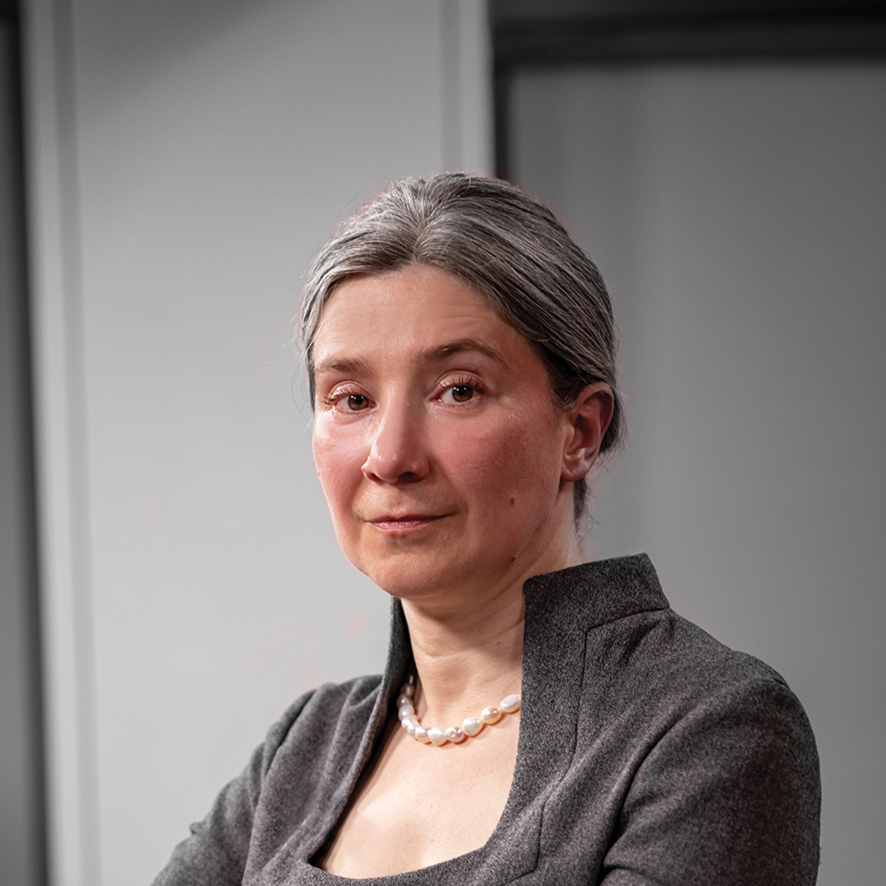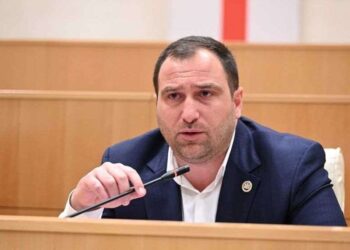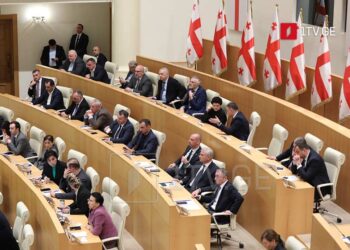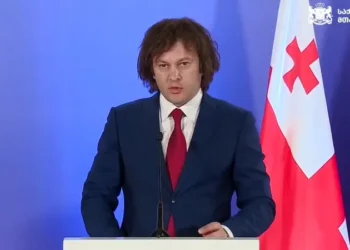Ekaterina Schulmann is a Russian political scientist specializing in legislative processes. She was an associate professor at RANEPA from 2013 to 2022 and an associate professor at the Moscow School for the Social and Economic Sciences from 2021 to 2022. She currently serves as an associate fellow of Chatham House. Radio Free Europe/RL’s Georgian Service sat down with her to discuss Russian values and the changing attitudes to the war.
We all know who the top man is in Russia, but who is second and how much sway and power do they hold?
I’ve called Russia a “bureaucratic autocracy.” It’s a personalist autocracy in strict political science classification. We don’t have a ruling party like party autocracies, Russia is not run by a military junta like military autocracies, and we don’t have an established succession mechanism that monarchies have. So, we’re a personalist autocracy: Power is concentrated in the hands of the leader and his immediate surroundings. However, we’re a big country that can’t be run by a president and his five friends alone.
In my opinion, the one real institution of Russia is its bureaucracy, both civic and armed. People change, institutions remain; this is the technical definition of an institution. So we don’t have a vertical in the sense that you have the second man, the third man, the fourth man, etc. We have the first person and then after that empty space. We have these big clans, and it’s the job of an autocrat to preserve the balance. He’s an arbiter of intra-elite conflict, though he’s not very good at it.
In Russia, hard currency, gold, or foreign currency have value; people have no value whatsoever
It has always been the case in Russia’s history that people are abundant, but money is scarce. Hard currency, gold, or foreign currency have value; people have no value whatsoever.
Does the job include making sure that no second man ever emerges?
Yes, exactly. So that no second clan or primus inter pares emerges. You have those clans and you try to keep them there, not allowing anyone to become the first and gain inordinate power.
And are the clans vying for second status after the tsar, or are they vying to become the tsar themselves? What are the maximum and minimum goals if you are a clan vying for power in Putin’s “court”?
I don’t like this monarchy metaphor; I think it’s misleading. Of course it’s natural to call a man a tsar if he’s been in his position for 25 years. But a monarchy, first and foremost, has a formal succession mechanism. We don’t have that.
I’d look at this clan system from the resource-based angle: They’re vying for resources. They need to preserve their resource base, at a minimum. At a maximum, they need to expand. That’s what this power game is all about. Of course, the clan which manages to install a successor of its own wins the game. But now that’s only a distant perspective. Before that, they have to “run twice as fast” to stay in place, like in Lewis Carroll’s Alice’s Adventures in Wonderland, to preserve their resources or to grab other people’s belongings.
A year ago, in an interview, you said that thinking war has become the norm in Russia would be a mistake. Is this still true after Prigozhin’s demise, Navalny’s death, Russian fortunes seemingly turning for the better in the war, and Putin seemingly growing stronger domestically?
I think that accustoming themselves to a war and being tired of it appear to be one and the same thing. We know from sociological data that war ceased to be popular with the majority of Russians approximately by the end of 2023. Still, support is concentrated in the elder demographic. The main concern expressed by respondents is that it is taking so long, they don’t understand why it should be taking so long.

To win?
It’s not “why is it taking so long for us to win?” It’s not about losing or stopping the war. In a situation of military censorship and lack of public discussion, it’s hard to know exactly what people mean. But we can assume the majority would be glad to have this war over. They don’t understand all the implications of it. They can’t picture all the consequences, but they are tired of living in constant anxiety and unpredictability. They’re afraid of the new mobilization. They don’t like Belgorod being bombed.
Some of them might say the only way to stop Belgorod from being bombed is to take Kyiv, but the idea of the majority is that an end to the war would be a good thing. Some of them say the war should end with our victory: “That’s why we want the war to end, because the end means we have won.” But I suspect this is something like lip service, the right thing to say, the socially approved answer. Because you can’t very well say, “I want this war to end no matter how it ends.”
And for the elites, since we’re not in a democracy, what people want doesn’t matter much. But the mood of the elites is fluid, they’re not very strategic people. For example, a couple of months ago the general idea among the elites was that “we’ll just have to hold on through the end of 2024 and then Donald the savior will come and make everything right for Russia.” This has changed. There isn’t much hope in Donald Trump any longer.
Putin will leave a brutalized society with a higher crime rate and all positive social tendencies reversed, from alcohol consumption to violent crime
So there’s been much more talk about an agreement. I’d describe it like this, which may seem paradoxical but I hope you’ll understand what I mean: The elites love the state of war, because it strengthens their position internally. They have more money than they had previously, they have more political sovereignty. They like the besieged fortress situation, which again simplifies internal policy management. They like everything except the actual military action, because it’s unpredictable, it’s costly, it elevates people like Prigozhin, it creates constant anxiety, and it costs a lot of money, and some of this money goes to the people and they don’t like that, they don’t like paying that much.
The Russian state has never paid that much money to its people for anything – for their work, for their life, for their death, for whatever. The idea that Russia is a country of limitless resources is a propaganda picture. But the strange thing, and it is so strange that we can’t realize it, is this: It has always been the case in Russia’s history that people are abundant, but money is scarce.
Hard currency, gold, or foreign currency have value; people have no value whatsoever. “We have as much human capital as we need.” Now it’s the other way around. I can’t adequately explain to you, I can’t even explain to myself what a gamechanger it is. They don’t understand it themselves, because they’ve never seen anything like this.
For the first time in the history of Russia, Russia has to pay for dead Russians.
Exactly, and we don’t have enough Russians. We have more money than we know what to do with, but we don’t have the people, either on the front lines or back home. We have a huge labor deficit, and very slowly there comes a realization that you can’t pay 1.25 million rubles to a person who in two weeks’ time will be killed in a senseless “meat grinder,” as the expression goes.
The army management doesn’t understand this yet. The political leadership doesn’t understand it yet, but is slowly beginning to realize it. I don’t know what the implications will be; I can only tell you as a social scientist that it’s a huge change.
It was said that Russian mothers will rise up “when the coffins start flowing home.” Over two years into the war and some half a million dead Russian soldiers later, we don’t see Russian mothers in the streets much. Where are they?
It’s typical for generals to form their estimation based on previous experiences. There was a soldiers’ mothers’ movement during and after the Soviet-era Afghanistan war and the two Chechen wars, because those wars were waged with conscripts, and anyone can become a conscript. It was a death toll that implicated the whole social base; every social stratum could be affected. This war is run on strictly feudal lines, on the lines of, I would say, wild capitalism. It’s a market arrangement. Money is paid and you go voluntarily.
You’re not corralled into it; you’re getting paid for it.
Of course. Even the mobilized, unless they were very stupid – and some of them were, though it was not their fault, they just had no education so couldn’t understand their rights and the consequences of their actions – but mostly people knew what they were after: money. Money for themselves; money for their families.
There’s a movement of the wives of the mobilized that, in fairness, we have to mention. And it has been impossible to either quash it or, as is more customary for the Russian political machine, to take it over. So they had to declare it a “foreign agent,” which is kind of ridiculous. And I read that designation as an admission of defeat. They could do nothing with it, so they were driven to a ridiculous decision.
So Putin took a soldier and he got killed defending Russia’s interests, but apparently his wife is a “foreign agent” for wanting her husband back home. This is, again, self-defeating. We need to mention this movement and not dismiss it, it’s important; but it hasn’t become a widespread one.
Do you think it will?
It will if the payments are stopped.
A year ago, when the war didn’t seem to be going in Russia’s favor, there was much talk about inflicting strategic defeat on Russia and Russia being weakened as a result of this war. Is this still in the cards?
I can’t talk about military matters, I don’t have the expertise. But I can tell you one thing as a social scientist and as a Russia watcher: Whatever factor we take, be it the labor crisis that I mentioned, the demographic situation, the economic imbalances, the aging of personalist rule, the infighting of the clans, where now everyone has a little private army of their own, each and every one of these factors and all of them in combination are factors of long-term decline.
As a Russian citizen, as a Russian educator, I get no pleasure at all in saying this. The question that I get is whether this or that event or occurrence or tendency will, in stark terms, upset Putin or defeat Russia; and the answer is no, not immediately. But none of them will go away. It will be a country with an aging society, with a disbalanced economy, with an incompetent leadership, and these are the factors of inevitable decline. It’s very bad. It’s bad for the country; it’s bad for the continent.
Should one be afraid of weakening Russia, as many in the West seem to be?
One shouldn’t be clutching at Putin as the devil we know and an antidote to chaos. He is an agent of chaos. The longer he stays, the worse the legacy he will leave.
He will leave behind a deinstitutionalized system that is based wholly on personal relations, and when these people disappear, those relations will be nullified. He will leave a brutalized society with a higher crime rate and all positive social tendencies reversed, from alcohol consumption to violent crime. So the longer he stays, the worse it will be afterwards.
These so-called long reigns, long personalist reigns, are very often followed by what we call in Russian history a “time of troubles,” a “smuta.” It’s not inevitable, but it’s highly possible. Perhaps we’ll somehow wiggle out of this crisis without unduly endangering our own lives and the safety of Eurasia, but that’s not guaranteed.
Interview by Vazha Tavberidze














